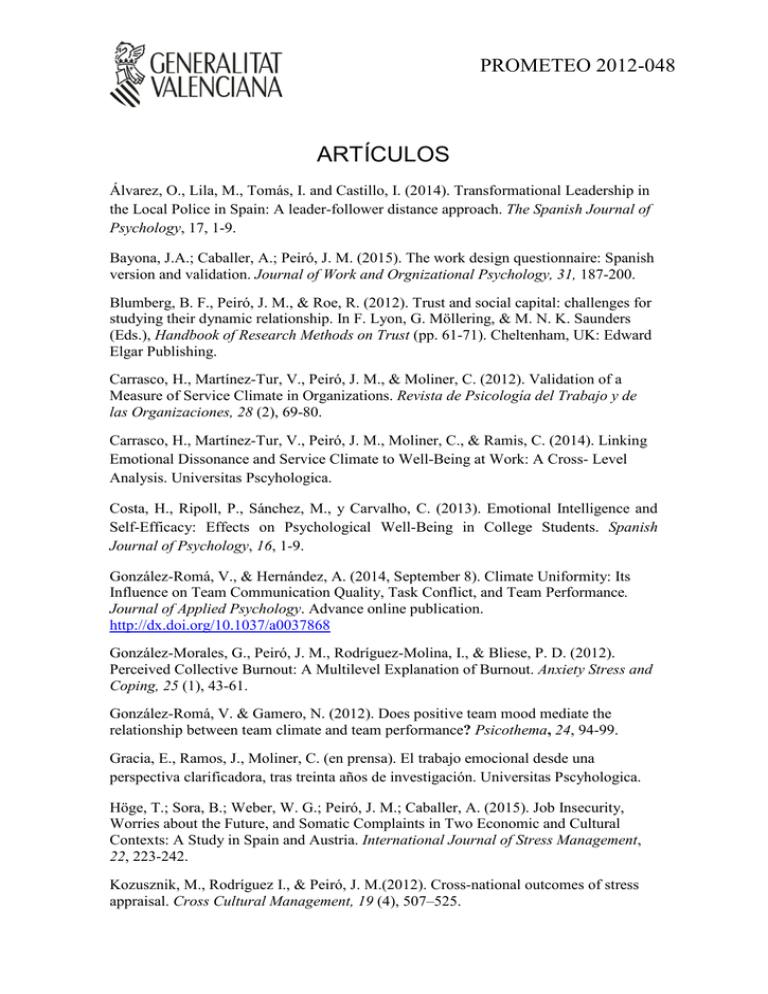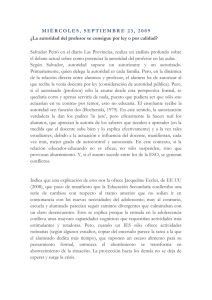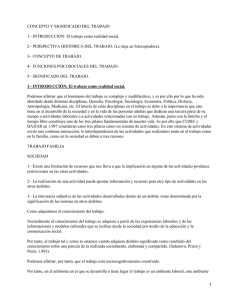Listado de artículos publicados
Anuncio

PROMETEO 2012-048 ARTÍCULOS Álvarez, O., Lila, M., Tomás, I. and Castillo, I. (2014). Transformational Leadership in the Local Police in Spain: A leader-follower distance approach. The Spanish Journal of Psychology, 17, 1-9. Bayona, J.A.; Caballer, A.; Peiró, J. M. (2015). The work design questionnaire: Spanish version and validation. Journal of Work and Orgnizational Psychology, 31, 187-200. Blumberg, B. F., Peiró, J. M., & Roe, R. (2012). Trust and social capital: challenges for studying their dynamic relationship. In F. Lyon, G. Möllering, & M. N. K. Saunders (Eds.), Handbook of Research Methods on Trust (pp. 61-71). Cheltenham, UK: Edward Elgar Publishing. Carrasco, H., Martínez-Tur, V., Peiró, J. M., & Moliner, C. (2012). Validation of a Measure of Service Climate in Organizations. Revista de Psicología del Trabajo y de las Organizaciones, 28 (2), 69-80. Carrasco, H., Martínez-Tur, V., Peiró, J. M., Moliner, C., & Ramis, C. (2014). Linking Emotional Dissonance and Service Climate to Well-Being at Work: A Cross- Level Analysis. Universitas Pscyhologica. Costa, H., Ripoll, P., Sánchez, M., y Carvalho, C. (2013). Emotional Intelligence and Self-Efficacy: Effects on Psychological Well-Being in College Students. Spanish Journal of Psychology, 16, 1-9. González-Romá, V., & Hernández, A. (2014, September 8). Climate Uniformity: Its Influence on Team Communication Quality, Task Conflict, and Team Performance. Journal of Applied Psychology. Advance online publication. http://dx.doi.org/10.1037/a0037868 González-Morales, G., Peiró, J. M., Rodríguez-Molina, I., & Bliese, P. D. (2012). Perceived Collective Burnout: A Multilevel Explanation of Burnout. Anxiety Stress and Coping, 25 (1), 43-61. González-Romá, V. & Gamero, N. (2012). Does positive team mood mediate the relationship between team climate and team performance? Psicothema, 24, 94-99. Gracia, E., Ramos, J., Moliner, C. (en prensa). El trabajo emocional desde una perspectiva clarificadora, tras treinta años de investigación. Universitas Pscyhologica. Höge, T.; Sora, B.; Weber, W. G.; Peiró, J. M.; Caballer, A. (2015). Job Insecurity, Worries about the Future, and Somatic Complaints in Two Economic and Cultural Contexts: A Study in Spain and Austria. International Journal of Stress Management, 22, 223-242. Kozusznik, M., Rodríguez I., & Peiró, J. M.(2012). Cross-national outcomes of stress appraisal. Cross Cultural Management, 19 (4), 507–525. PROMETEO 2012-048 Kozusznik, W., Rodríguez, I., & Peiró, J.M. (2015). Eustress and Distress Climates in Teams: Patterns and Outcomes, International Journal of Stress Management. 22, 1-23. Latorre Navarro, M. F., Gracia, F. J., Tomás, I. y Peiró, J. M. (2013). Validation of the group nuclear safety climate questionnaire. Journal of Safety Research, 46, 21-30. Le Blanc, P.M. & González-Romá, V. (2012). A team level investigation of the relationship between Leader–Member Exchange (LMX) differentiation, and commitment and performance. The Leadership Quarterly, 23, 534–544. Lira, E. y Ripoll, P. (2014). La relevancia de la potencia de grupo en la efectividad de los equipos virtuales. Anuari de Psicologia. Lira, E., Ripoll, P., Peiró, J.M., y Zornoza, A. (2013). The role of information and communication technologies in the relationship between group potency and group maintenance outcomes. A longitudinal study. Behavior & Information Technology, 32 (2), 147-155. López de Castro, B., Gracia, F., Peiró, J.M., Pietrantoni, L. y Hernández, A. (2013). Testing the validity of the International Atomic Energy Agency (IAEA) safety culture model. Accident Analysis & Prevention, 60, 231-244. Martínez-Córcoles, M., Gracia, F. J., Tomás, I., Peiró, J. M., & Schöbel, M. (2013). Empowering team leadership and safety performance in nuclear power plants: A multilevel approach. Safety Science, 51 (1), 293-301. Martínez-Córcoles, M., Schöbel, M., Gracia, F., Tomás, I., & Peiró, J. M. (2012). Linking empowering leadership to safety participation in nuclear power plants: A structural equation model. Journal of Safety Research, 43 (3), 215-221. Martínez-Moreno, E., Orengo, V., & Zornoza, A. M. (2012). El papel del entrenamiento autoguiado en la relación entre el conflicto de tarea y la innovación en los equipos virtuales. Psicothema, 24 (1), 29-34. Martínez-Moreno, E., Zornoza, A. M., González-Navarro, P., & Foster Thompson, L. (2012). Investigating face-to-face and virtual teamwork over time: When does early task conflict trigger relationship conflict?. Group Dynamics: Theory, Research, and Practice, 16 (3), 159-171. Martínez-Moreno, E.; Zornoza, A.; Orengo, V. y Thompson, L. F. (2015). The Effects of Team Self-Guided Training on Conflict Management in Virtual Teams. Group Decision and Negotiation, 24, 905-923. Martínez-Tur, V., Moliner, C., Ramos, J., Luque, O., y Gracia, E. (2014). Calidad y bienestar en organizaciones de servicios: el papel del clima de servicio y la justicia organizacional. Papeles del Psicólogo, 35, 99-106. PROMETEO 2012-048 Molina, A., Moliner, C., Martinez-Tur, V., Cropanzano, R., & Peiró, J.M. (2014). Unitlevel Fairness and Quality within the Health Care Industry: A Justice-Quality Model. European Journal of Work and Organizational Psychology, 24, 627-644. DOI: 10.1080/1359432X.2014.960401 Moliner, C., Gracia, E., Lorente, L. y Martínez-Tur, V. (2013). Structure and validation of a contextual quality of life scale for people with intellectual disabilities in social services: an organization-oriented measure from an external perspective. Perspectivas em Gestão & Conhecimento, 3, 80-94. Moliner, C., Martínez-Tur, V., Peiró, J.M., Ramos, J. y Cropanzano, R. (2013). Perceived reciprocity and well-being at workin non-professional employees: fairness or self-interest? Stress and Health, 29 (1), 31-39. Monzani, L., Ripoll, P., & Peiró, J.M. (2014). Followers’ agreeableness and extraversion and their loyalty towards authentic leadership. Psicothema, 26(1), 69-75. Monzani, L., Ripoll, P., & Peiró, J.M. (2015). The moderator role of followers’ personality traits in the relations between leadership styles, two types of task performance and work result satisfaction. European Journal of Work and Organizational Psychology, 24, 444-461. DOI:10.1080/1359432X.2014.911173 (Online version) Monzani, L., Ripoll, P., Peiró, J.M., & Van Dick, R. (2014). Loafing in the digital age: The role of computer mediated communication in the relation between perceived loafing and group affective outcomes. Computers in Human Behavior, 33, 279–285. Monziani, L. & Peiró, J.M. (in press). The synergistic effect of prototypicality and authenticity in the relation between leaders' gender and their organizational Identification. Journal of Business Ethics. Peiró, J.M., Ayala, Y., Tordera, N., Lorente, L., & Rodríguez, I. (2014). Bienestar sostenible en el trabajo: Revisión y reformulación. Papeles del Psicólogo, 35, 5-14. Peiró, J.M., Bresó, I., Orengo, V. & Gracia, F.J. (2014). Efectos diferidos y concurrentes del clima de grupo sobre los cambios en el aprendizaje de equipo: el rol modulador de la presión temporal y la sobrecarga de trabajo. Universitas Psychologica, 13 (2), 15-29. Peiró, J.M.; Gracia, F.J.; Martínez-Córcoles, M. (2015). Desarrollos recientes en el estudio de la cultura de seguridad y sus correlatos: el papel del liderazgo. Nuclear España-Revista de los Profesionales del Sector Nuclear-359, 43-47 Peiró, J. M., Sora, B., & Caballer, A. (2012). Job insecurity in the younger Spanish workforce: Causes and consequences. Journal of Vocational Behavior, 8 (2), 444-453. PROMETEO 2012-048 Peñarroja, V. Orengo, V., Zornoza, A. ; Sánchez, J. y Ripoll, P. (2015). How team feedback and team trust influence information processing and learning in virtual teams. Computers in Human Behavior, 48, 9-16. Peñarroja, V., Zornoza, A., Orengo, V. y Hernández, A. (2013). The effects of virtuality level on task-related collaborative behaviors: The mediating role of team trust. Computers in Human Behavior, 29 (3), 967-974. Picazo, C., Gamero, N., Zornoza, A., & Peiró, J.M. (2015). Testing relations between group cohesion and satisfaction in project teams: A cross-level and cross-lagged approach. European Journal of Work and Organizational Psychology, 24, 297-307. http://dx.doi.org/10.1080/1359432X.2014.894979 Ramos, J. y Peiró, J. M. (2014). La psicología del trabajo y las organizaciones en tiempos de crisis Económica. Papeles del Psicólogo, 35 (1), 1-4. (Introducción a la primera parte de la Sección Monográfica). Ramos, J. y Peiró, J. M. (2014). La psicología del trabajo y las organizaciones en tiempos de crisis Económica (2ª parte). Papeles del Psicólogo, 35 (2), 81-82. (Introducción a la segunda parte de la Sección Monográfica). Rodríguez, I., Kozusznik, M. y Peiro, J.M. (2013). Development and Validation of the Valencia Eustress-Distress Appraisal Scale. International Journal of Stress Management. Advance online publication. DOI: 10.1037/a0034330 Rubio, C.; Osca, A.; Recio, P.; Urien, B.; Peiró, J. M. (2015). Work-family conflict, self-efficacy, and emotional exhaustion: A test of longitudinal effects. Revista de Psicología del Trabajo y de las Organizaciones, 31, 147-154 Sora, B., Caballer, A., Peiró, J.M. y De Witte, H. (2013). Outcomes of Job Insecurity Climate: The Role of Climate Strength. Applied Psychology - An International Review, 62 (3), 382 - 405. Tordera, N. y González-Romá, V. (2013). Leader-Member Exchange (LMX and Innovation Climate: the Role of LMX Differentiation. The Spanish Journal of Psychology, 16, 1-8. Castillo, I., Tomás, I., Ntoumanis, N., Bartholomew, K., Duda, J. L., and Balaguer, I. (2014). Psychometric properties of the Spanish version of the Controlling Coach Behaviors Scale in the sport context. Psicothema, 26 (3), 409-414. Cristiani, A. & Peiró, J.M. (2014). Human resource function strategic role and trade unions: exploring their impact on human resource management practices in Uruguayan firms. The International Journal of Human Resource Management. http://dx.doi.org/10.1080/09585192.2014.925946 (Online version). PROMETEO 2012-048 Hernández, A., Tomás, I., Ferreres, A., y Lloret, S. (2015). Tercera evaluación de Tests Editados en España. Papeles del Psicólogo, 36, 1-8. Hernández, A., Tomás, I., Ferreres, A., y Lloret, S. (2015). Nuevas directrices sobre el uso de los tests: investigación, control de calidad y seguridad. Papeles del Psicólogo, 36, 161-173. Lloret, S., Ferreres, A., Hernández, A., y Tomás, I. (2014). El análisis factorial exploratorio de los ítems: una guía práctica, revisada y actualizada. Anales de Psicología, 30(3), 1151,-1169. Lunt, I., Job, R., Peiró, J. M., Poortinga, Y., & Roe, R. (2014). EuroPsy: Standards and quality in education for psychologists. pp. 1 – 86. Hogrefe Publishing. Martínez-Córcoles, M., Gracia, F.J., Tomas, I., & Peiró, J.M. (2014). Strengthening Safety Compliance in Nuclear Power Operations: A Role-Based Approach. Risk Analysis, 34(7), 57-69. Meyer, B., Glenz, A., Antino, M., Rico, R., & González-Romá, V. (2014) Faultlines and subgroups: A meta-review and measurement guide. Small Group Research. Advance online publication. http://sgr.sagepub.com/content/early/2014/10/01/1046496414552195 Monzani, L.; Ripoll, P.; Peiró, J.M. (2015). Winning the hearts and minds of followers: The interactive effects of follower’s emotional competencies and goal setting types on trust in leadership. Revista Latinoamericana de Psicología, 47, 1-15. Monzani, L.; Ripoll, P.; Peiró, J.M. (2015). The moderator role of followers’ personality traits in the relations between leadership styles, two types of task performance and work result satisfaction. European Journal of Work and Organizational Psychology, 24, 444-461. Pineda-Espejel, H.A., López-Walle, J., y Tomás, I. (2014). Validación de la versión mexicana del CSAI-2R en sus escalas de intensidad y dirección. Revista Mexicana de Psicología, 31(2), 198-212. Sora, B., Caballer, A., & Peiró, J.M. (2014). La inseguridad laboral y sus consecuencias en un contexto de crisis económica. Papeles del Psicólogo, 35, 15-21. Tomás, I., Marsh, H. W., González-Romá, V., Valls, V., and Nagengast, B. (2014). Testing Measurement Invariance across Spanish and English versions of the Physical Self-Description Questionnaire: an application of Exploratory Structural Equation Modeling. Journal of Sport and Exercise Psychology, 36, 179-188.

